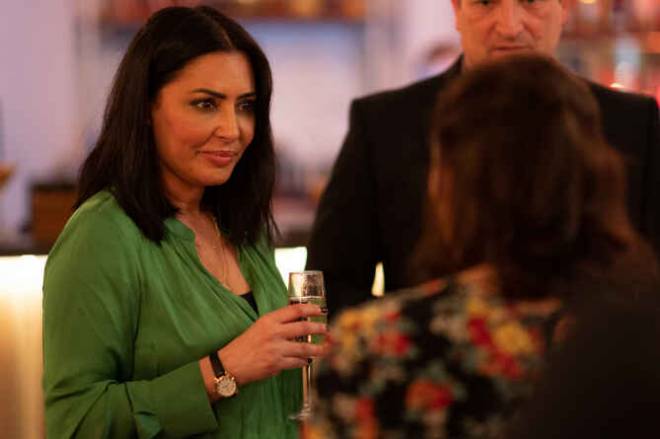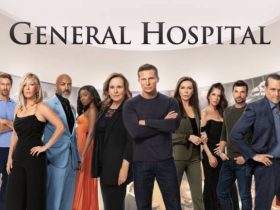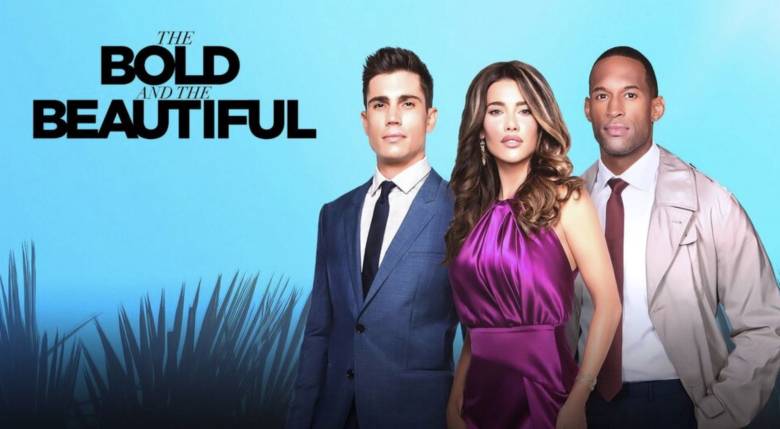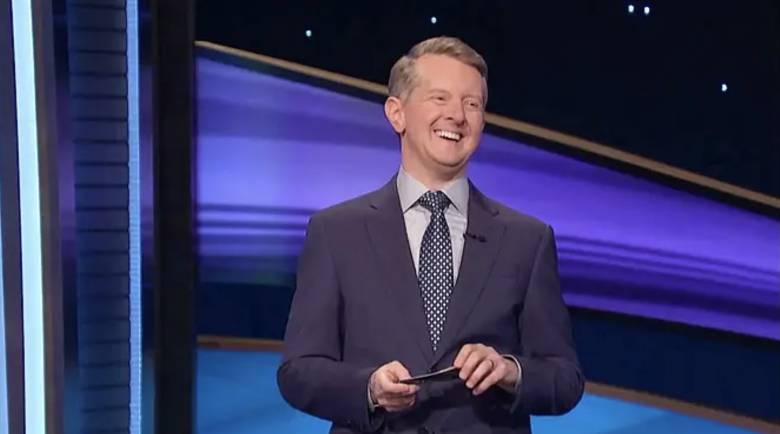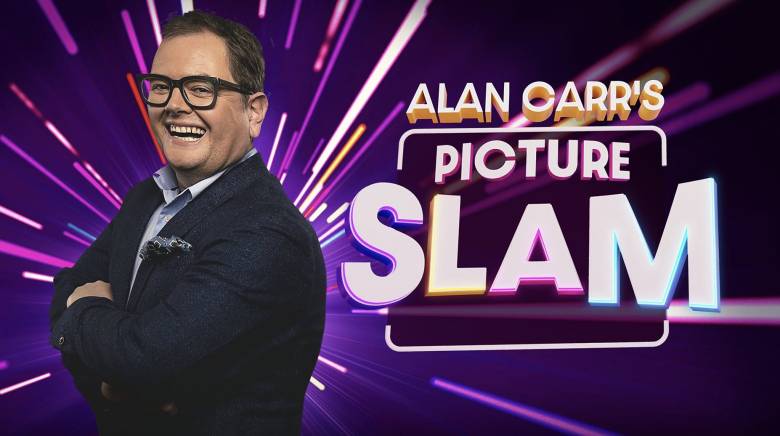What interested you about this role?
It’s a detective show, so why wouldn’t I do it? I’ve never done anything like this before. The writing is phenomenal, and the whole team is incredible. And I love Michael and Laura, but I haven’t worked with them before.
Tell us about your character
She’s a real go-getter! She’s a confident, ambitious, independent woman, unforgiving in a way, and unapologetic for who she is. I absolutely loved her. I imagine she’s an only child, a princess, but she’s really talented as well, so there’s many layers to her. She’s happily married to Neil, they’ve got a nice house, they’ve worked hard for it, and she would do anything she can to preserve that. She’s shameless like that. It’s hard to see these two together because they’re miles apart, but that’s what she loves about him. He’s sort of the opposite to her, but he adores her. There’s a lot of self-serving going on in that relationship.
When we first see her, she’s winning an award.
That was the first thing I shot! She’s really good at her job. She’s comfortable with herself, and confident enough to go up there and collect the award, but people often don’t know how to take her.
Describe her first meeting with Sarah. What does she make of her?
When you live with someone, you know their mannerisms, so you pick up on things straightaway. So when Azra gets the award, she walks into the bar, and Neil is already with the group. She’s like, “Get me a drink!” because she’s obviously been doing her press or whatever. She sees Sarah, and straight away notices how attractive she is. Like, “Is she a threat?” Neil must have mentioned her at some point, and there’s a slight awkwardness which she picks up on. I think she recognises there’s something there. She teases him on the way home, and she’s quite condescending, but I don’t think she takes it seriously. She probably thinks, “Oh, Sarah likes my husband.” But then Sarah and Neil work together, so they’re in close proximity. It’s awkward, it’s uncomfortable for the both of them, and there’s obviously some flirtation going on, or perhaps there has been in the past. You also see more of their family lives, so you get a nice picture of how they live, and their morning routines. It gives some depth to the characters.
How does Azra deal with that growing sense of unease?
She tackles it head on. I don’t like confrontation, so she’s nothing like me! She’s not afraid of looking you straight in the eye, and waiting for you to say something, give her an excuse. Not that she wants to fight, but what you see is what you get. If she’s got an issue, she wants to deal with it there and then. There’s a scene where her and Neil have got a meeting with the governors, and she’s saying to him, “No, we need to talk tonight.” She’s very mechanical in that way, there’s no faffing about. With Sarah, she’s professional enough to think, “I can’t start any trouble at work, but if she says something, then I’ll give it a go.”
The scripts are quite technical, aren’t they?
It’s tough! But when your character is so good at what she does, you have to sound like you know what you’re saying. You can’t umm and ahh your way through it. When you’re under pressure, these things just roll off your tongue because you know the lingo, you know the language. That was a challenge, but if you don’t do that, it doesn’t come across as authentic. It does take you a long time to learn the lines because of that, because it’s something that’s so alien to who you are.
Did you make life even more difficult by having a Scottish accent?
No, I had my accent, which was such a relief! I wouldn’t even know where to begin. Rohit’s Scottish accent was so good, I didn’t even know he was from Birmingham! Literally, we were chilling out between scenes, and he started talking in this Brummie accent. His whole tone changes as well, becomes lower. I’m like, “What are you doing?” He’s like, “This is my accent.” I couldn’t believe it. He became a different person, it was bizarre. He had to use his Scottish accent when I was around, because I couldn’t handle it. I can do some accents, but Scottish, I can’t do.
Obviously, you are working most closely with Michael Nardone.
He’s glorious! He’s the most beautiful man. I miss them all so much, because it’s the nicest team. I’m obsessed with Laura, she’s beautiful. Michael is so generous and so supportive. He’s travelled so much, and I love people that have travelled. I love hearing about their adventures and experiences in other cultures, and crazy life stories. He’s got loads of them, and he’s a very good storyteller. Peter (Forbes) is a lovely man, who actually my sister was working with last week. Rohit was the baby, I adopted him. I was mothering him, because it’s his first job. He probably got sick of it! Kyle (Gardiner) came in at the end, it was his first job too, so you’ve got so much life coming into the show with this young cast. I love these young people, and find it so inspiring to be around them. Being around these young, beautiful people who are starting their careers alongside these seasoned actors is such a lovely environment to be in.
Having a female ensemble is getting more common these days. How did it feel to be doing that?
It was the same when I did Safe. We were sat down and told what to do if there was anything we were uncomfortable with. That’s what happens when you work with women. Every inch of ground is covered, you feel protected, and you’re in an environment where you feel you can talk to people if you need to. That’s a very important foundation which extends not just to the actors, but to everyone on the project. That’s what creates that atmosphere. Don’t get me wrong, I’ve worked on lots of jobs which have been predominantly men, and it’s been great fun, and I’ve not had any problems. But in this climate that we’re in, it’s nice to know that you’re working with a bunch of people where, if you do have an issue, you can talk to them, and there’s no reason for you to feel, “I can’t bring this up,” or, “They’re going to think this or that.” It’s so comfortable.
As an actress, do you feel the parts you’re getting offered these days are getting a bit more interesting?
I wouldn’t have been offered these parts 20 years ago, but I don’t know what the parts were like for women of my age back then. It’s not about diversity, it’s about inclusion. So it’s not just women, we need more people from the LGBTQ+ community, more people from the black community, from the Asian community, disabled actors, because then it’s authentic. You can relate to the characters, because they’re real. That’s what’s changing, and that’s what’s exciting. We’ve got more women writing for women, whether that’s older women or younger women. It all needs to be celebrated, but we all need to do it justice by making it as authentic and sincere as possible, and I think that’s what that brings when you bring in people from different communities to write characters for those communities. There’s a certain texture to it that you don’t get when it’s written by somebody else.
Did you get to shoot any of your scenes in Dundee?
Sadly, I didn’t get to go to Dundee, but I was completely inspired to go to Scotland. It’s such a beautiful place, and it was such a joy to discover something that’s just around the corner. I’ve got lots of Scottish friends, so I was used to the accent and the humour. Michael is also half Italian – and I love Italy, it’s one of my favourite countries – so there’s a real passion there. He’s not loud, but when he talks, he gives it a hundred percent. So, when he tells me about his adventures in Morocco, I can visualise what he’s talking about. It was such a happy set. I had a great time.

